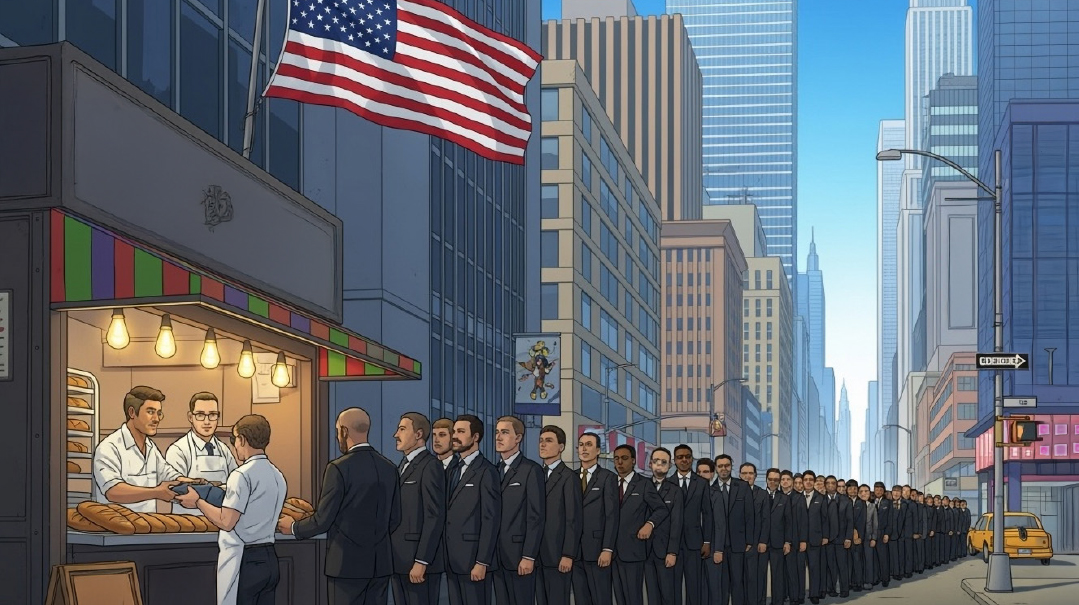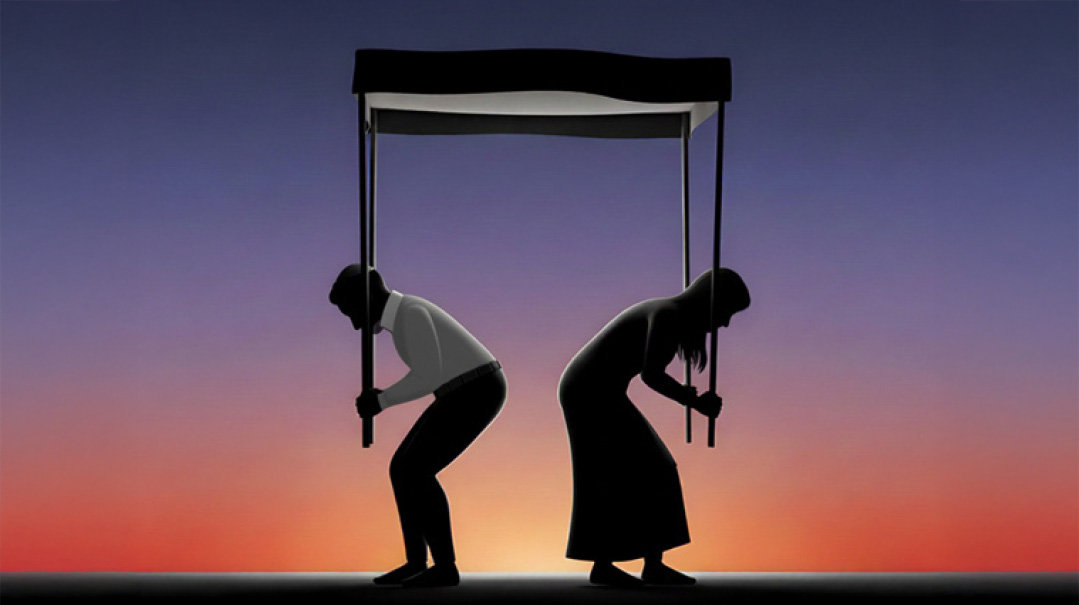Conversation on the Breadline

“You wanted to know how a guy like this wins the primary. You’re why”

MYShabbos guest this week was a young Sabra living on a tight budget and lots of grit. Like most Israelis, he devours the news — both national and international — and holds strong opinions about everything from the contested Shin Bet chief to Putin’s drones.
“So,” he said as we started on the first course, “everyone’s talking about this Mamdani guy. They’re all saying how crazy his policies are. You’re from New York, you’re American. Can you explain how he won the primary over there?”
“I can try,” I offered. “First of all, he’s young, he’s slick, and he ran a really solid campaign. He had 50,000 volunteers knocking on people’s doors and a strong social media presence. He campaigned hard and smart — he even held events in bars. I think you could say that he met young voters where they were at.”
“Okay, but what did he promise them?”
“So a lot of what he did is appeal to a sense of grievance. That means he told people, you deserve more, you deserve better, and the powers that be have taken away all those things you deserve. If you elect me, I’m going to wrest it back for you. That’s a very powerful tactic. It plays to people’s resentments and paints him as the hero who will deliver justice. People are very receptive to that kind of message. Trump used it, too. It works.”
“Okay, but what did he tell people they deserve? What are they resentful about?”
“New York City is a very expensive place to live. One thing he promised is free transportation.”
“That sounds nice. Definitely makes it cheaper to get to work, to get around.”
“Right. And another is a massive rent freeze.”
“You mean, to make housing more affordable. Which makes life more affordable.”
“Well, that depends whether you’re the tenant or the landlord. And eventually it comes back to the tenants, too — if landlords can’t afford to maintain their buildings, the tenants suffer.”
“Nu, it’s really hard for young people to pay rent.” (He’s a young person whose primary monthly expense is rent. Obviously.) “Anything else?”
“Yes, he’s promising to open government-run grocery stores, with lower prices.”
“I like that!”
“You want to wait in line for bread, like in communist Russia?”
“Come on, it wouldn’t be like that. Groceries are really expensive.”
“But the math doesn’t add up. His plan to bankroll these government-operated supermarkets relies on money that doesn’t exist. He misunderstood a government report on grocery subsidies — he thought the government was granting $140 million in subsidies to corporate grocery stores, when really that was the amount the stores themselves had invested. So the city budget really doesn’t have the money to cover his plan.”
An eyeroll. “Nu, so he’ll figure out the money. This is New York. They have a huge budget.”
A pause.
“So,” I reminded him, “you wanted to know how a guy like this wins the primary. You’re why.”
“Me? I don’t live in New York.”
“Right, but people like you — your age, your stage, your mindset — they’re the ones who voted for him. They’re the ones who think his policies sound great. Like you do.”
A shrug. “Yeah. I do.”
This might sound strange, but my Shabbos guest reminded me of the Holocaust memoir I reread almost every Tishah B’Av: Rav Pinchas Hirschprung’s Vale of Tears (Azrieli Foundation, 2016).
Rav Hirschprung was a prized talmid of Rav Meir Shapiro of Lublin who eventually served as Montreal’s chief rabbi. It is unusual for a gadol of his stature to write a memoir, certainly a memoir laced with so much drama, emotion, and wit. The account is also unusual in its immediacy and vividness — likely due both to Rav Hirschprung’s remarkable memory and the fact that it was a fresh impression recorded in 1944, before the war had concluded, crafted as weekly installments in the Canadian Yiddish newspaper Keneder Adler.
So what about the Mamdani conversation reminded me of the memoir? A fascinating thread in the memoir is Rav Hirschprung’s evolving attitude toward communist ideals. Along with his prodigious mastery of Torah, he was intellectually curious and very well-read, and he openly discusses his affinity for this new economic system — until his escape from the Nazis brought him to Soviet territory, and he actually had to live under the communist regime.
In Communist-controlled Lemberg, Rav Hirschprung was urged to join the lines of people waiting for bread — a wait that could take several days. At one point he passed two newly-erected statues of Lenin and Stalin. He recounts [p. 148-149]:
One of the people there, by his ragged and disheveled appearance a member of the lumpenproletariat [the Marxist term for the lowest segment of the working class], stood beside the monument shaking his head…. Someone shouted from the crowd in Ukrainian, “Mekhtadi, why are you shaking your head?”
“I’m shaking my head and thinking, ‘Stalin! Stalin! Why don’t you have any feet? If you had a pair of feet, you would be able to stand in line.’”
Marxist jokes aside, communist ideals have long been alluring to the younger generation. In the time of Rav Hirschprung, the “liberation of the oppressed” beckoned to young Jews because it was a radical opportunity to escape their no-way-out existence of grinding poverty. The new regime promised equal opportunity, equal jobs, and equal pay to Jews (as long as they committed to atheist principles and committed to work on Shabbos — stipulations that provided a bracing reality check for a young Rav Hirschprung). It’s hard for us today, with our Westernized mentality and years of equal legal standing, to relate to a life with restricted job opportunities, restricted living options, and zero hope for any upward mobility. For the Jews of that era, though, communism promised an epochal righting of a deep and painful injustice. As a desperate man on the run, Rav Hirschprung thought — ironically enough — that this system could “solve the Jewish problem.”
Rav Hirschprung’s youthful attraction to communism wasn’t just about escaping poverty — it was about the dream of fairness for the toiling masses. That dream, I think, still tugs at the hearts of many idealistic young people today. Children instinctively bristle at unfairness (or lack of equity), which they conflate with injustice. When you’re young, you’re taught that if you work hard, you’ll see results. If you clean up the toys, you’ll get a chocolate chip. If you review your math tonight, you’ll get a good mark on the quiz tomorrow. In the adult world, the link between effort and results is less linear. Sometimes it’s entirely absent. It can be disillusioning, even painful, to see people who don’t work very hard at all but still have fat bank accounts — or people who put in endless hours of manual labor as janitors or factory workers, but will never be able to afford a home. (At least not in New York. But that’s a different conversation.) If you have a compassionate heart, you want to see things get better for those struggling masses. Why wouldn’t you support a system that magically makes housing and transportation and groceries more affordable?
And while there are so many mature and admirable young people today who are the furthest thing from entitled — who don’t think they deserve to be supported just because, and who make tough but forward-thinking choices — there is also a different subset. These are the people who have gotten so accustomed to collecting and receiving that they see it as their right. Some parents call them the “failure to launch” generation. These youngsters haven’t yet made the shift that Hashem programmed into us all, from dependence and entitlement to a mindset that squirms at free handouts and instead savors the sweetness of the fruits won only after one’s own labor. For those young people, the idea of just making life easy for everyone can sound very appealing.
TOall those romantic thinkers pulled by Mamdanis of the past and present, it’s important to remember that the system of “soak the rich to prop up the poor” has some fatal flaws. Human beings have an inherent need to see fruits of their labors; a system that divorces reward from effort disincentivizes accomplishment and progress.
And then there’s the mathematical flaw: Once the resources have been well and truly plundered from the moneyed classes (or once they all move to Florida — whichever happens first), there is no longer enough money to finance everyone else. The global list of failed communist experiments, and failing countries, proves that Marx’s plan for economic paradise just doesn’t pan out in real life.
As frum Jews, we have other problems with Marx and his modern-day successors. As Rav Hirschprung quickly discovered, the system is almost always accompanied by anti-religious policy. But our opposition to communism (and its little comrade socialism) stems not only from the movements’ historic or current baggage — be it an anti-religious, anti-Semitic, anti-elite, or anti-Israel agenda that inevitably gets schlepped along. It’s because the system at heart is anti-Torah. One of the foundations of halachah is the concept of personal ownership and individual property. When mortals try building a society that contravenes the foundations of the world, the resulting structure is fated to crumble — it literally has no pillars to stand on.
Granted, when capitalism goes too far, it leads to a Sedom mindset, where sympathy is a weakness, sharing is forbidden, and chesed is a crime. And while so many mitzvos and virtually all the halachos of Choshen Mishpat are predicated on personal ownership, a Torahdig society also includes a strong communal safety net and an ethos of responsibility for other people’s welfare — down to food allotments for Kohanim and Leviim and mandated gifts for the poor. It’s certainly not the purely capitalist model. Instead, there’s a sense that we are all interconnected, and if Hashem gifted you with more, He also expects more generosity.
As believing Jews, our job is to become more G-dlike, and in part that means to be givers. This doesn’t require that anyone’s finances be forcibly appropriated and redistributed by a central committee of apparatchiks. In fact, it can’t mean that. Giving is meaningful only when there exists ownership — when we have the moral strength to take that which belongs to us and willingly, knowingly, deliberately give it to someone else. You can’t be a giver in Marx’s world.
Rav Hirschprung’s Europe is no longer, and the engine driving so many youngsters of his era toward Russian communism has long sputtered to a stop. But the promise of a future paradise is still luring a starry-eyed new generation that thrills at the idea of one for all and all for one — or at least at the idea of those privileged, moneyed elites financing free bus rides in the Big Apple.
It’s telling that most of the Mamdani fans are young: in age, in spirit, and maybe in life experience. And it’s interesting that proponents of his economic approach have historically left G-d out of the picture. If you don’t have a firm foundation of faith that there’s a Divine Banker apportioning everyone’s bank accounts, forced redistribution of capital can feel like a logical, even virtuous cause. People who don’t have that belief can’t help but feel impoverished or incensed when they see a pie unevenly distributed.
But as we grow in our bitachon and life experience we learn, and accept, that everyone gets their own package, with its own shape and size and appendages. All we can do is wisely manage our resources here in this world, while understanding that the ultimate accounting — and reward — will only be dealt out in the next.
(Originally featured in Mishpacha, Issue 1069)
Oops! We could not locate your form.







